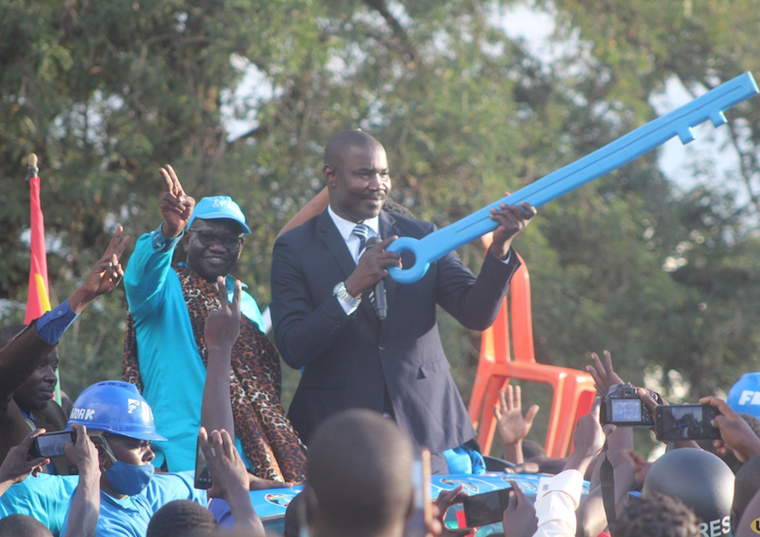Uniting Opposition in Uganda

Staring down similar challenges and a very powerful opponent, the incumbent President Yoweri Museveni, opposition presidential candidates met last Friday ostensibly to assemble a strategy that best boosts their political desires.
After the meeting, the five presidential signed a joint statement, resolving to work together on problems that dog their campaigns. The meeting followed the arrest and detention of National Unity Platform (NUP) presidential candidate, Robert Kyagulanyi Ssentamu aka Bobi Wine in the eastern district of Luuka.
Kyagulanyi was accused of holding a rally that drew more than 200 people; the recommended number by the ministry of Health and the Electoral Commission. The arrest sparked protests that killed at least 49 people. The arrest of Kyagulanyi led other presidential candidates; Norbert Mao, of the Democratic Party, Gregory Mugisha Muntu of the Alliance for National Transformation (ANT), Lt Gen Henry Tumukunde and John Katumba, both independents, to suspend their campaigns. Subsequently, Muntu, Tumukunde and Mao who were joined by FDC chairman Wasswa Biriggwa and NUP vice president Lina Zedriga met to agree a way forward. Their meeting excited supporters who are itching to have a united opposition against President Museveni.
Some political observers think that a united opposition led by a single presidential candidate portends trouble for Museveni’s 35-year-long grip on power. If he is elected on January 14, 2021 for another five-year term, Museveni will extend his rule to 40 years. Interviewed for this story, different party officials said it’s very unlikely that opposition forces can present a united front against Museveni. Speaking to The Observer, officials said opposition politicians can only agree to work together on matters that affect them all.
Joel Ssenyonyi, the NUP spokesperson, said they tried and failed to get a joint presidential candidate.
“Everyone went out and got nominated but at least we maintained an open communication line; that’s why we are able to operate in solidarity. Once one presidential candidate is arrested, the others come out and suspend their campaigns,” Ssenyonyi said.
He said opposition candidates should not see themselves as competitors but, rather, as people pushing to achieve the same goal.
“We should carry the same message to our supporters,” Ssenyonyi said. Ibrahim Ssemujju Nganda, the Kira Municipality MP and spokesperson for the opposition Forum for Democratic Change, said the ongoing discussions are not in any way focused on getting a single candidate because that is impossible at this point.
“I don’t want to give people false hope; there is absolutely no possibility that there will be a joint electoral platform. Each one of us was nominated and went through some form of elections like the youth elections, which are almost complete now. We also nominated candidates for local government, parliament and the presidency; that is what it will be until the election cycle is finished,” Ssemujju said.
He said discussions now revolve around issues discussed before nominations kicked off this month.
“There are issues that are going to affect all of you and you can take similar stands. All the discussions that people are going to see are not discussions about a single candidate but about the police, the military and the infectiveness and failure of the Electoral Commission to rein-in these different agencies,” Ssemujju said.
Interviewed, Okoler Opio Amanu, the spokesperson of the Democratic Party, said his party is still optimistic that it’s not entirely impossible to agree a single presidential candidate. He said in case they disagree, they should at least agree to have the strongest candidates concentrate their energies more in areas they command a comparative advantage to deny President Museveni the 51 percent of the vote required to become president.
“Every participant in this election knows that the best thing is for the opposition forces to unite. We should have done it earlier so that we don’t have everybody on the ballot paper. But if we don’t agree, then we should concentrate on our strongholds,” Okoler said. In the past, the opposition has tried severally and failed to present a united front against President Museveni. But Dr Sam Kazibwe, a scholar and political pundit, believes the best way to take on Museveni is to have more than one candidate.
“A multi-dimensional approach, I think, can be a little more effective in a society like ours where we take part in an election that is not free and fair. If you have Mao in the north where he can consolidate his support, you have Amuriat (FDC) in Teso and Kyagulanyi in Buganda and the eastern, it makes sense. They can agree on things like guarding the ballot… So, I think it is possible because it can deny the president a 51 percent outright win to become president,” Kazibwe said.
For now, Kazibwe believes talk of a single candidate is a waste of time. “I would rather they focus on the issues where it’s possible to agree; things like guarding the vote, putting pressure on the Electoral Commission and these are easy to achieve than telling candidates to quit; you would be wasting valuable time, which is needed badly,” Kazibwe said. But Ssenyonyi vehemently disagrees with the suggestion that each candidate concentrates on his or her stronghold.
“That would make sense if we had a joint candidate and others are not candidates so they are deployed where they are strong and rally support for our candidate but now everyone is a candidate; it doesn’t make sense,” Ssenyonyi said.
Emmanuel Dombo, the director for Information and Publicity at the National Resistance Movement secretariat, said whatever the opposition does, doesn’t affect them as the ruling party. He said President Museveni is capable of defeating all his opponents.
“I don’t think they have the same manifestos unless the people don’t vote for manifestos. But for us, we have a manifesto, which clarifies what we have done and what we intend to do for the different areas. I don’t know whether they will be preaching their manifesto verses our manifesto or they are going to amplify their hatred for the president. I think that cannot be reason enough for somebody voting for a specific leader. Therefore, I doubt whether their coming together can make any big impact,” Dombo said.
FAILURE OF TALKS
According to people interviewed for this story, there were intense talks between FDC and its People’s Government wing headed by former four-time presidential candidate Dr Kizza Besigye about having a joint electoral platform. However, these alks came to naught because some, especially in NUP, believed they had an upper hand.
Interviewed, Ssemujju, said it is hard to talk people out of elections they had already planned to take part in.“The reason we failed was because the people who attended these meetings are candidates; they go in looking for an opportunity to be the joint candidate not for an opportunity to create a joint electoral platform. There are very few people in Uganda who can accept not to be candidates after declaring their candidature,” Ssemujju said. Ssenyonyi said pretty the same thing.
“At the time FDC told us they had to let their party processes work, get a presidential candidate and then we can sit together to have a joint candidate. There was willingness to work together but by the time they got a candidate it was too late to have talks about a joint candidate,” Ssenyonyi said.
IS A BOYCOTT POSSIBLE?
When Lt Gen Henry Tumukunde’s campaigns were interrupted in western Uganda, he suggested that all candidates pull out of the election. The same proposition was made by Amuriat, who however, added that they should opt for another alternative for taking on Museveni. However, both his party and NUP have ruled out boycotting the election outright.
“This election is part of the struggle for liberation and we are not going to back out of the race because it is part of the avenues to bring change. The ground is not leveled; they mistreat us and we are swimming against the tide, but we have to swim, nonetheless,” Ssenyonyi said.
Ssemujju said what is happening is not a campaign but, rather, a mobilization drive aimed at sensitizing their people to get involved more in the affairs of their country.
“We convinced ourselves that Museveni will not want us to meet people; that’s why he’s arresting and beating up people. Museveni is without shame; you can’t withdraw thinking that now he is going to feel very bad that candidates are not campaigning. We went into this election well aware of the hurdles and I want to assure everyone that we are not going to abandon this struggle. There is nothing that has happened that we didn’t know will happen, maybe the killing of many people. There is no way we are going to abandon Museveni; we are going to square him up until the campaigns are done,” Ssemujju said.
Kazibwe also doesn’t believe that a boycott is the best alternative. He said candidates should push on until the last whistle is blown. He is optimistic that the state cannot continue using an iron fist like it has done in the first 15 days of the campaigns. “
I don’t think the state has the capacity to use its agents to engage in these acts of violence for the next 50 days. Otherwise, how many people would they have to kill before January 14?” Kazibwe said.



